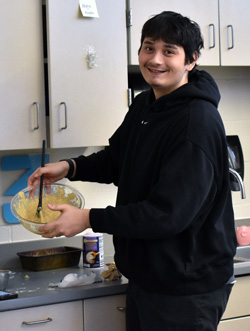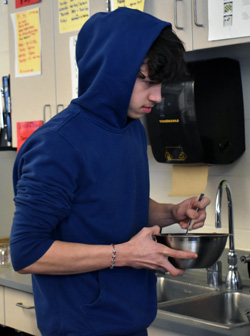Sparta — Who knew banana bread could come from a lesson on macromolecules? But that’s exactly what happened in a new Science of Cooking class at Sparta High School.
After analyzing bananas for starch content and extracting DNA, students in Kirsten Clemans’ class recently whipped up batches of bread using the extra yellow fruit. The riper the better, they learned, as the ripening process converts starch to sugar, which makes for a sweeter bread.
Senior Brooklyn Paige admits she is not a good cook. But as she looks forward to heading off to college next year, she thought it would be a good idea to learn how — and get science credit to boot.

“It’s a really cool experience …” she said. “It’s a unique, fun class to take.”
Students divided into groups, then picked out a recipe to follow. Clemans provided the basic ingredients like flour, sugar, butter and eggs. Students brought in extras like chocolate chips, walnuts or vanilla.
“It’s a banana bread bonanza,” said sophomore Jackson Jones as he cleaned up with his group after they put their bread in the oven.
“Not bad, not bad,” said another student after tasting his group’s creation.
Said sophomore Simon Kingshott: “I’ve never had (banana bread) before, in my memory. I love working with my peers.”
Clemans, who started teaching the class last semester, said her class makes about 10 recipes, including students’ choice of one recipe.
“Chili was the first thing that we did,” she recalled. “And then we’re going to get into some more chemistry stuff, so we’re going to do some little things like making popcorn, making ice cream, that don’t maybe quite take the whole hour. We make pasta from scratch, which is fun.”

The Basics & Beyond
Class topics include kitchen basics such as safety, sanitation, preparation, knife skills and seasonings, as well as fermentation, food allergies, food-borne illness and proper cooking temperatures.
Future lessons will explore chemical reactions, for example, such as what happens when one ingredient is changed when baking cookies, like using baking soda instead of baking powder or brown sugar in place of white sugar.
The popular class was open to all students this year, but next year will be limited to grades 10-12 so freshmen can learn some basic concepts before taking the class.
Clemans and seven students recently made a presentation at a Board of Education meeting.
“It has been amazing to see students grow in their kitchen, science and interpersonal skills,” Clemens said.
Clemens also said she wants to add a community relationship element that may include reaching out to local farms for speakers or trips, and a community service element that can raise awareness of food insecurity in the area.
Read more from Sparta:
• Making mathematicians
• Welding sparks her life











